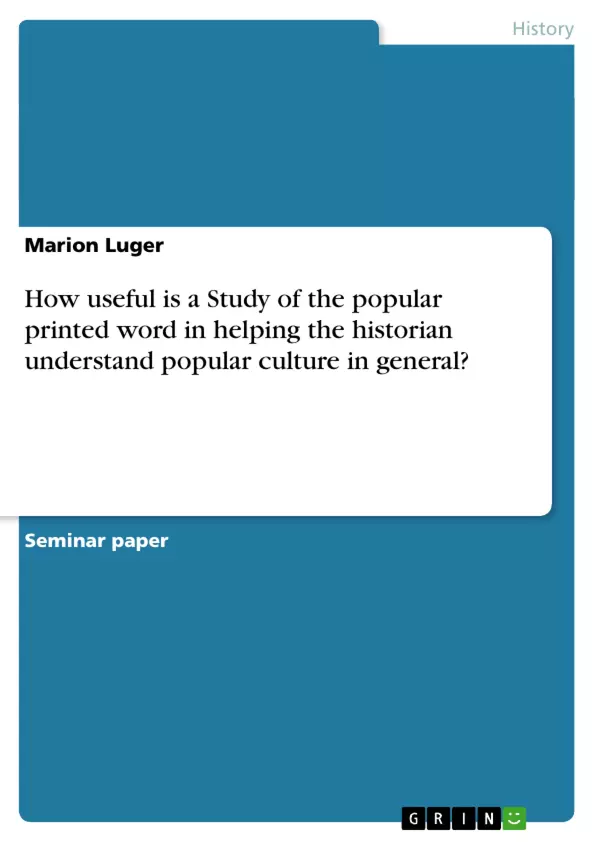Throughout recent years, in the discipline of historical sciences an extensive evolution has taken place. The transformation from the history of policies to “Historical Anthropology” (including several steps in between) involved not only entirely new topics, but also different approaches. In this development, the field of interest changed from investigating the lives of a few “important” authorities to those of the main part of “ordinary” agents. In order to explore the usefulness of “popular” writings for historic research, we firstly have to determine a suitable definition of the term “popular” (section II) . Thereupon, section III describes several kinds of printed sources read, respectively written by “the public” as well as appropriate modes of interpretation. Finally, section IV examines cons and pros of using certain written records and their impacts on the knowledge of “popular” culture.
Inhaltsverzeichnis (Table of Contents)
- I. Introduction
- II. How can we define “popular”?
- III. Possible sources and methods of interpretation
- IV. Disadvantages… and advantages of interpreting “popular” writings…
- V. Summary
Zielsetzung und Themenschwerpunkte (Objectives and Key Themes)
This essay examines the usefulness of "popular" writings for historical research. It aims to determine whether and how analyzing these texts can provide insights into popular culture in general. The essay delves into defining "popular" in the context of historical studies, analyzing various sources, and exploring both the challenges and benefits of interpreting "popular" writings.
- Defining "popular" in historical research
- Sources and methods for interpreting "popular" writings
- Advantages and disadvantages of using "popular" writings
- The role of "popular" culture in understanding historical societies
- The evolution of historical research from policy-focused to anthropological approaches
Zusammenfassung der Kapitel (Chapter Summaries)
I. Introduction: This section introduces the evolution of historical research from a focus on political figures to a broader examination of "ordinary" people. The essay sets out to explore the potential of "popular" writings for understanding popular culture.
II. How can we define “popular”?: The essay acknowledges the difficulty of defining "popular" culture, tracing the historical development of the concept and highlighting its contested nature. It critiques earlier romanticized views of "popular" culture and proposes an alternative definition based on the culture of subordinate classes.
III. Possible sources and methods of interpretation: This chapter delves into various types of printed sources that can be considered "popular" writings, examining their potential for historical research. It also discusses appropriate methods for interpreting these sources, including considering their context, intended audience, and potential biases.
IV. Disadvantages… and advantages of interpreting “popular” writings...: This chapter examines the potential limitations and benefits of using "popular" writings in historical research. It acknowledges the challenges of interpreting these texts, including potential biases and the need to consider their context and intended audience. However, it also emphasizes the unique insights they can offer into the lives, beliefs, and experiences of "ordinary" people.
Schlüsselwörter (Keywords)
This essay explores the use of "popular" writings for historical research, focusing on the challenges and benefits of interpreting these texts. Key themes include defining "popular" culture, identifying and analyzing diverse sources, and understanding the complex relationship between elite and subordinate cultures in Western Europe during the 16th to 18th centuries.
Frequently Asked Questions
What is "Historical Anthropology"?
It is a sub-discipline of history that shifts focus from political elites to the lives, beliefs, and cultures of "ordinary" people in society.
How is "popular culture" defined in historical research?
The essay defines it as the culture of subordinate classes, critiquing earlier romanticized views and acknowledging its contested nature.
Why are "popular" writings useful for historians?
They provide unique insights into the daily experiences and mentalities of the public that traditional political records often ignore.
What are the challenges of using popular printed sources?
Challenges include identifying potential biases, understanding the intended audience, and accounting for the context in which they were written.
What sources are considered "popular" writings?
Sources include broadsheets, pamphlets, chapbooks, and other mass-produced printed materials read by the general public between the 16th and 18th centuries.
- Citar trabajo
- Marion Luger (Autor), 2000, How useful is a Study of the popular printed word in helping the historian understand popular culture in general? , Múnich, GRIN Verlag, https://www.grin.com/document/135013



